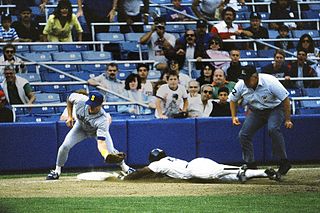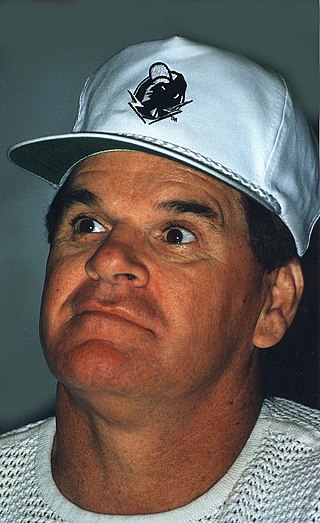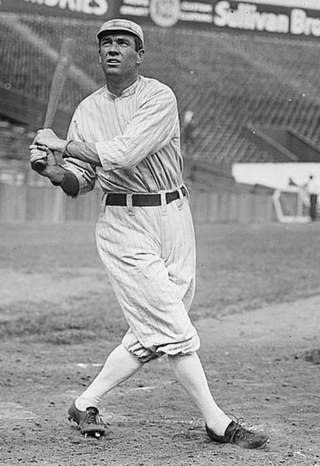
In baseball statistics, a hit, also called a base hit, is credited to a batter when the batter safely reaches or passes first base after hitting the ball into fair territory with neither the benefit of an error nor a fielder's choice.

In baseball, a stolen base occurs when a runner advances to a base unaided by other actions and the official scorer rules that the advance should be credited to the action of the runner. The umpires determine whether the runner is safe or out at the next base, but the official scorer rules on the question of credit or blame for the advance under Rule 10 of the MLB's Official Rules.

In baseball, a single is the most common type of base hit, accomplished through the act of a batter safely reaching first base by hitting a fair ball and getting to first base before a fielder puts him out. As an exception, a batter-runner reaching first base safely is not credited with a single when an infielder attempts to put out another runner on the first play; this is one type of a fielder's choice. Also, a batter-runner reaching first base on a play due to a fielder's error trying to put him out at first base or another runner out is not credited with a single.
In baseball, fielder's choice refers to a variety of plays involving an offensive player reaching a base due to the defense's attempt to put out another baserunner, or the defensive team's indifference to his advance. Fielder's choice is not called by the umpires on the field of play; rather, it is recorded by the official scorer to account for the offensive player's advance without crediting him with an offensive statistic such as a hit or stolen base.

In baseball, a double is the act of a batter striking the pitched ball and safely reaching second base without being called out by the umpire, without the benefit of a fielder's misplay or another runner being put out on a fielder's choice. A double is a type of hit and is sometimes called a "two-bagger" or "two-base hit". For statistical and scorekeeping purposes it is denoted by 2B.

In baseball, a triple is the act of a batter safely reaching third base after hitting the ball, with neither the benefit of a fielder's misplay nor another runner being put out on a fielder's choice. A triple is sometimes called a "three-bagger" or "three-base hit". For statistical and scorekeeping purposes it is denoted by 3B.

In baseball and softball statistics, an error is an act, in the judgment of the official scorer, of a fielder misplaying a ball in a manner that allows a batter or baserunner to advance one or more bases or allows a plate appearance to continue after the batter should have been put out. The term error is sometimes used to refer to the play during which an error was committed.

An outfielder is a person playing in one of the three defensive positions in baseball or softball, farthest from the batter. These defenders are the left fielder, the center fielder, and the right fielder. As an outfielder, their duty is to catch fly balls and ground balls then to return them to the infield for the out or before the runner advances, if there are any runners on the bases. As an outfielder, they normally play behind the six players located in the field. By convention, each of the nine defensive positions in baseball is numbered. The outfield positions are 7, 8 and 9. These numbers are shorthand designations useful in baseball scorekeeping and are not necessarily the same as the squad numbers worn on player uniforms.







